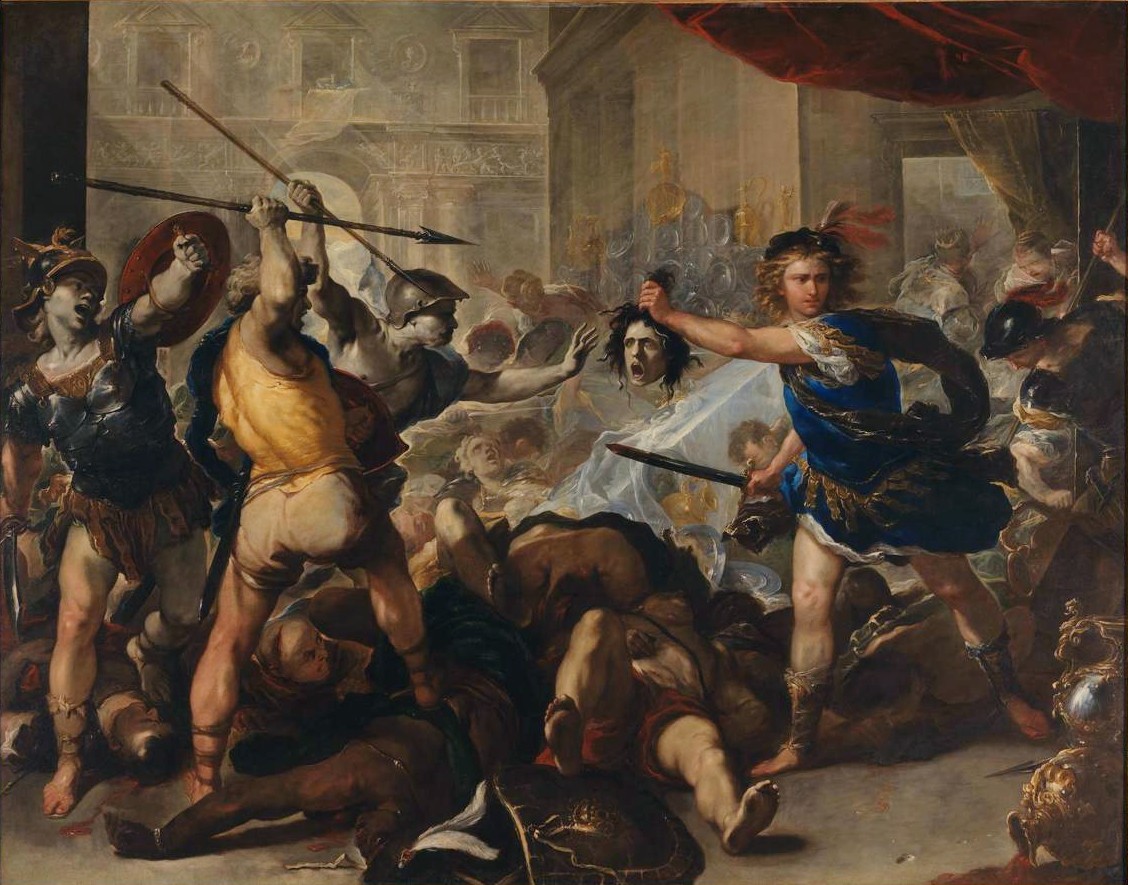Phineus (son Of Belus) on:
[Wikipedia]
[Google]
[Amazon]
 In
In
5. 200–49
/ref>
 In
In Greek mythology
A major branch of classical mythology, Greek mythology is the body of myths originally told by the Ancient Greece, ancient Greeks, and a genre of Ancient Greek folklore. These stories concern the Cosmogony, origin and Cosmology#Metaphysical co ...
, Phineus ( /ˈfɪniəs, ˈfɪn.juːs/; Ancient Greek
Ancient Greek includes the forms of the Greek language used in ancient Greece and the ancient world from around 1500 BC to 300 BC. It is often roughly divided into the following periods: Mycenaean Greek (), Dark Ages (), the Archaic peri ...
: Φινεύς, ) was a son of Belus by Anchinoe and thus brother to Aegyptus
In Greek mythology, Aegyptus or Ægyptus (; grc, Αἴγυπτος) was a legendary king of ancient Egypt. He was a descendant of the princess Io through his father Belus, and of the river-god Nilus as both the father of Achiroe, his mother ...
, Danaus
In Greek mythology, Danaus (, ; grc, Δαναός ''Danaós'') was the king of Libya. His myth is a foundation legend of Argos, one of the foremost Mycenaean cities of the Peloponnesus. In Homer's ''Iliad'', "Danaans" ("tribe of Danaus") and " ...
and Cepheus.
Mythology
Phineus had been engaged to Cepheus' daughter Andromeda before she wedPerseus
In Greek mythology, Perseus (Help:IPA/English, /ˈpɜːrsiəs, -sjuːs/; Greek language, Greek: Περσεύς, Romanization of Greek, translit. Perseús) is the legendary founder of Mycenae and of the Perseid dynasty. He was, alongside Cadmus ...
, and Phineus plotted against him, leading Perseus to turn him and his co-conspirators into stone by showing them the head of Medusa
In Greek mythology, Medusa (; Ancient Greek: Μέδουσα "guardian, protectress"), also called Gorgo, was one of the three monstrous Gorgons, generally described as winged human females with living venomous snakes in place of hair. Those ...
. The affair appears to have formed part of Euripides
Euripides (; grc, Εὐριπίδης, Eurīpídēs, ; ) was a tragedian
Tragedy (from the grc-gre, τραγῳδία, ''tragōidia'', ''tragōidia'') is a genre of drama based on human suffering and, mainly, the terrible or sorrowful e ...
' lost '' Andromeda'', but the sole extensive ancient treatment is found Ovid
Pūblius Ovidius Nāsō (; 20 March 43 BC – 17/18 AD), known in English as Ovid ( ), was a Roman poet who lived during the reign of Augustus. He was a contemporary of the older Virgil and Horace, with whom he is often ranked as one of the th ...
's ''Metamorphoses
The ''Metamorphoses'' ( la, Metamorphōsēs, from grc, μεταμορφώσεις: "Transformations") is a Latin narrative poem from 8 CE by the Roman poet Ovid. It is considered his ''magnum opus''. The poem chronicles the history of the wo ...
''.
In Ovid's account Perseus asked for Andromeda's hand in return for saving the girl from the sea-monster Cetus
Cetus () is a constellation, sometimes called 'the whale' in English. The Cetus (mythology), Cetus was a sea monster in Greek mythology which both Perseus and Heracles needed to slay. Cetus is in the region of the sky that contains other water- ...
to whom an oracle had ordained Andromeda be sacrificed as punishment for her mother Cassiopeia's boast that she was more beautiful than the Nereids
In Greek mythology, the Nereids or Nereides ( ; grc, Νηρηΐδες, Nērēḯdes; , also Νημερτές) are sea nymphs (female spirits of sea waters), the 50 daughters of the 'Old Man of the Sea' Nereus and the Oceanid Doris, sisters ...
. Perseus was successful, but as he recounted his deeds to the court of Cepheus a spear-brandishing Phineus assailed him:
Phineus' presumed motive in marrying Andromeda was to strengthen his claim to the throne, rather than any interest in the girl herself. Cepheus scolded his brother for this outburst, pointing out that he had done nothing to help Andromeda in the crisis, but Phineus still cast his spear at Perseus. Although he missed, a fierce battle ensued in which many fell until Perseus, surrounded by a large number of warriors, held up the head of the Gorgon, turning enemies still alive but Phineus to stone. Amazed by this, Phineus pleaded for his life with his gaze averted, but Perseus approached him and held the head before his eyes, turning Phineus to stone.''Met''5. 200–49
/ref>
References
Bibliography
* . * . * {{Citation, last=Kannicht, first=R., title=Tragicorum Graecorum Fragmenta, volume=V, place=Göttingen, year=2004, isbn=3525257554. *Pseudo-Apollodorus
The ''Bibliotheca'' (Ancient Greek: grc, Βιβλιοθήκη, lit=Library, translit=Bibliothēkē, label=none), also known as the ''Bibliotheca'' of Pseudo-Apollodorus, is a compendium of Greek myths and heroic legends, arranged in three book ...
, ''Apollodorus, The Library, with an English Translation by Sir James George Frazer, F.B.A., F.R.S. in 2 Volumes.'' Cambridge, MA, Harvard University Press; London, William Heinemann Ltd. 1921.
Characters in Greek mythology
Metamorphoses characters